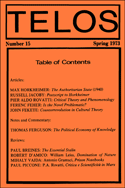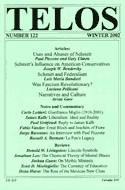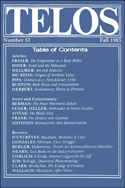By Telos Press · Tuesday, January 26, 2016 Telos readers in the New York City area may be interested in an upcoming event at the John D. Calandra Italian American Institute:
On the occasion of the paperback reprint of Renzo De Felice’s The Jews in Fascist Italy, this panel will explore the genesis of the book and its place in contemporary historiography.
Commissioned by the Union of the Italian Jewish Communities and published in 1961, it was the first study of the anti-Jewish persecution in Italy to reach a general audience. It was also a young historian’s first book on the Fascist era. This glance into a chapter of national history, that Italy had been quick to bury, set De Felice on a path to become one of the leading and most controversial scholars of Fascism.
Continue reading →
By Lewis West · Friday, February 27, 2015  In November 1939, gangs of German civilians and Nazi operatives stormed Jewish stores, synagogues, and homes, killing or arresting those who could not escape. The Nazi leadership had carefully planned the assault—Kristallnacht would become only one among many instances of unimaginable horror. In the coming years, the Nazis proceeded to murder thousands of disabled Germans; when Germany invaded Russia, groups of special units—known as Einsatzgruppen—followed closely behind the German army, liquidating Jews, Communists, and Roma.[1] By 1942, the Nazi death camps had initiated yet another gruesome and terrifying phase of the Reich’s program of anti-Semitism and racial purity.[2] In November 1939, gangs of German civilians and Nazi operatives stormed Jewish stores, synagogues, and homes, killing or arresting those who could not escape. The Nazi leadership had carefully planned the assault—Kristallnacht would become only one among many instances of unimaginable horror. In the coming years, the Nazis proceeded to murder thousands of disabled Germans; when Germany invaded Russia, groups of special units—known as Einsatzgruppen—followed closely behind the German army, liquidating Jews, Communists, and Roma.[1] By 1942, the Nazi death camps had initiated yet another gruesome and terrifying phase of the Reich’s program of anti-Semitism and racial purity.[2]
Continue reading →
By Telos Press · Monday, October 27, 2014 In this video from the 2014 Telos in Europe Conference, Benjamin Martin talks about his research on the idea of European culture, arguing that its emergence among intellectuals after World War I and its subsequent embrace by the Nazis and Italian Fascists serves as a cautionary historical lesson.
Continue reading →
By Telos Press · Wednesday, October 1, 2014 In this short video, filmed at the recent Telos Conference in L’Aquila, Editor Russell A. Berman talks about the central themes and concerns of Telos 168 (Fall 2014): The West: Its Past and Its Prospects. We have posted Russell’s full introduction here, and you can order your copy of the issue in our online store.
Continue reading →
By Michael Millerman · Tuesday, August 12, 2014  Like Spinoza, many liberal thinkers have defined the liberty they promote in terms of the necessity of submitting to the law that guarantees it. This is a unique kind of rule of law, a rule of the “‘politically correct,’ universalist, managerial-liberal” (9) law of contemporary liberals. Both internationally and domestically, this law requires the muscular imposition of questionable political, moral, and economic principles, by means of an insidious and often nauseating bureaucratic, technocratic, mediacratic apparatus, onto largely unwilling publics. Crucially, the freedom championed by such liberals and allegedly secured by their law does not include the freedom to refuse their domination root and branch. Like Spinoza, many liberal thinkers have defined the liberty they promote in terms of the necessity of submitting to the law that guarantees it. This is a unique kind of rule of law, a rule of the “‘politically correct,’ universalist, managerial-liberal” (9) law of contemporary liberals. Both internationally and domestically, this law requires the muscular imposition of questionable political, moral, and economic principles, by means of an insidious and often nauseating bureaucratic, technocratic, mediacratic apparatus, onto largely unwilling publics. Crucially, the freedom championed by such liberals and allegedly secured by their law does not include the freedom to refuse their domination root and branch.
Continue reading →
By Matt Applegate · Tuesday, May 6, 2014 As an occasional feature on TELOSscope, we highlight a past Telos article whose critical insights continue to illuminate our thinking and challenge our assumptions. Today, Matt Applegate looks at Arshi Pipa’s “Gramsci as a (Non) Literary Critic” from Telos 57 (Fall 1983).
 Arshi Pipa’s “Gramsci as a (Non) Literary Critic” is more than a short biography and description of Antonio Gramsci’s inquiries into literary criticism. It also provokes the reader to meditate on the political conditions of literary criticism as an intellectual practice. Gramsci is a controversial figure in the history of literary criticism for at least two reasons, according to Pipa. First, his political work remains more prominent than his literary criticism. When one thinks of Gramsci as a writer and historical figure, his literary criticism might not even register, given his political writing and influence. Second, Gramsci’s politics serve as the impetus for his intellectual projects, thus also providing potential grounds to dismiss or ignore his aesthetic analyses. To be sure, Gramsci is a controversial political figure. In 1921 Gramsci co-founded and led the Communist Party of Italy in opposition to fascism, and was later arrested by fascist police under Mussolini, ultimately dying in prison in 1937. Perhaps his most famous collection of writings, Prison Notebooks, was completed while he was incarcerated between 1926 and 1937. Yet, it is precisely Gramsci’s controversial style and political will that draw Pipa to his work and allow him to question literary criticism as an enduring intellectual practice. Arshi Pipa’s “Gramsci as a (Non) Literary Critic” is more than a short biography and description of Antonio Gramsci’s inquiries into literary criticism. It also provokes the reader to meditate on the political conditions of literary criticism as an intellectual practice. Gramsci is a controversial figure in the history of literary criticism for at least two reasons, according to Pipa. First, his political work remains more prominent than his literary criticism. When one thinks of Gramsci as a writer and historical figure, his literary criticism might not even register, given his political writing and influence. Second, Gramsci’s politics serve as the impetus for his intellectual projects, thus also providing potential grounds to dismiss or ignore his aesthetic analyses. To be sure, Gramsci is a controversial political figure. In 1921 Gramsci co-founded and led the Communist Party of Italy in opposition to fascism, and was later arrested by fascist police under Mussolini, ultimately dying in prison in 1937. Perhaps his most famous collection of writings, Prison Notebooks, was completed while he was incarcerated between 1926 and 1937. Yet, it is precisely Gramsci’s controversial style and political will that draw Pipa to his work and allow him to question literary criticism as an enduring intellectual practice.
Continue reading →
|
|
 In November 1939, gangs of German civilians and Nazi operatives stormed Jewish stores, synagogues, and homes, killing or arresting those who could not escape. The Nazi leadership had carefully planned the assault—Kristallnacht would become only one among many instances of unimaginable horror. In the coming years, the Nazis proceeded to murder thousands of disabled Germans; when Germany invaded Russia, groups of special units—known as Einsatzgruppen—followed closely behind the German army, liquidating Jews, Communists, and Roma.[1] By 1942, the Nazi death camps had initiated yet another gruesome and terrifying phase of the Reich’s program of anti-Semitism and racial purity.[2]
In November 1939, gangs of German civilians and Nazi operatives stormed Jewish stores, synagogues, and homes, killing or arresting those who could not escape. The Nazi leadership had carefully planned the assault—Kristallnacht would become only one among many instances of unimaginable horror. In the coming years, the Nazis proceeded to murder thousands of disabled Germans; when Germany invaded Russia, groups of special units—known as Einsatzgruppen—followed closely behind the German army, liquidating Jews, Communists, and Roma.[1] By 1942, the Nazi death camps had initiated yet another gruesome and terrifying phase of the Reich’s program of anti-Semitism and racial purity.[2]  Like Spinoza, many liberal thinkers have defined the liberty they promote in terms of the necessity of submitting to the law that guarantees it. This is a unique kind of rule of law, a rule of the “‘politically correct,’ universalist, managerial-liberal” (9) law of contemporary liberals. Both internationally and domestically, this law requires the muscular imposition of questionable political, moral, and economic principles, by means of an insidious and often nauseating bureaucratic, technocratic, mediacratic apparatus, onto largely unwilling publics. Crucially, the freedom championed by such liberals and allegedly secured by their law does not include the freedom to refuse their domination root and branch.
Like Spinoza, many liberal thinkers have defined the liberty they promote in terms of the necessity of submitting to the law that guarantees it. This is a unique kind of rule of law, a rule of the “‘politically correct,’ universalist, managerial-liberal” (9) law of contemporary liberals. Both internationally and domestically, this law requires the muscular imposition of questionable political, moral, and economic principles, by means of an insidious and often nauseating bureaucratic, technocratic, mediacratic apparatus, onto largely unwilling publics. Crucially, the freedom championed by such liberals and allegedly secured by their law does not include the freedom to refuse their domination root and branch.  Arshi Pipa’s “Gramsci as a (Non) Literary Critic” is more than a short biography and description of Antonio Gramsci’s inquiries into literary criticism. It also provokes the reader to meditate on the political conditions of literary criticism as an intellectual practice. Gramsci is a controversial figure in the history of literary criticism for at least two reasons, according to Pipa. First, his political work remains more prominent than his literary criticism. When one thinks of Gramsci as a writer and historical figure, his literary criticism might not even register, given his political writing and influence. Second, Gramsci’s politics serve as the impetus for his intellectual projects, thus also providing potential grounds to dismiss or ignore his aesthetic analyses. To be sure, Gramsci is a controversial political figure. In 1921 Gramsci co-founded and led the Communist Party of Italy in opposition to fascism, and was later arrested by fascist police under Mussolini, ultimately dying in prison in 1937. Perhaps his most famous collection of writings, Prison Notebooks, was completed while he was incarcerated between 1926 and 1937. Yet, it is precisely Gramsci’s controversial style and political will that draw Pipa to his work and allow him to question literary criticism as an enduring intellectual practice.
Arshi Pipa’s “Gramsci as a (Non) Literary Critic” is more than a short biography and description of Antonio Gramsci’s inquiries into literary criticism. It also provokes the reader to meditate on the political conditions of literary criticism as an intellectual practice. Gramsci is a controversial figure in the history of literary criticism for at least two reasons, according to Pipa. First, his political work remains more prominent than his literary criticism. When one thinks of Gramsci as a writer and historical figure, his literary criticism might not even register, given his political writing and influence. Second, Gramsci’s politics serve as the impetus for his intellectual projects, thus also providing potential grounds to dismiss or ignore his aesthetic analyses. To be sure, Gramsci is a controversial political figure. In 1921 Gramsci co-founded and led the Communist Party of Italy in opposition to fascism, and was later arrested by fascist police under Mussolini, ultimately dying in prison in 1937. Perhaps his most famous collection of writings, Prison Notebooks, was completed while he was incarcerated between 1926 and 1937. Yet, it is precisely Gramsci’s controversial style and political will that draw Pipa to his work and allow him to question literary criticism as an enduring intellectual practice. 






